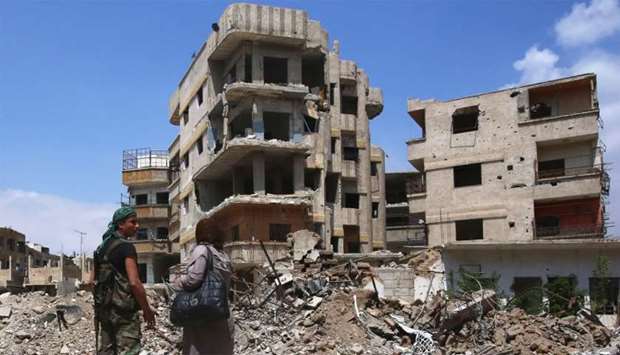Rebels in Syria's Eastern Ghouta surrendered their heavy weapons and their leader left the enclave, a monitor said Thursday, signalling the end of one of the bloodiest battles of Syria's seven-year war.
The Syrian flag was raised above the central mosque in Douma, the site of an alleged chemical attack that sparked outrage and threats of Western military action.
US President Donald Trump was mulling his options and British Prime Minister Theresa May called an emergency cabinet meeting Thursday, as the Syrian army braced for Western strikes, hiding assets and deserting key buildings.
Syrian regime forces had yet to take over Douma but the rebels it battled there since the launch of a blistering offensive in mid-February no longer appeared in a position to fight back.
Jaish al-Islam, which has controlled Eastern Ghouta's main town for years, had balked at a Russian-brokered deal like those that saw other factions bussed to northern Syria.
But the group seemed to have caved in on Wednesday, when its fighters handed over their heavy weapons and their leader, Issam Buwaydani, boarded a convoy out of Ghouta with thousands of other fighters and their relatives.
‘Jaish al-Islam fighters handed over their heavy weapons to Russian military police in the town of Douma on Wednesday,’ said the Syrian Observatory for Human Rights, a Britain-based monitoring group.
- Flag raised -
Douma residents told AFP that Syria's national red, white and black flag with two green stars was raised on Wednesday above the main mosque, which was also used as the office of the town's opposition-run council.
But a dispute subsequently erupted, shots were fired and the flag was taken down, the residents said.
Russian military police, who had started deploying in the town as part of a deal that would allow some rebels to disarm and stay in Douma, also left after the incident, the residents said.
Simultaneously carrying out air strikes, brokering talks and supervising humanitarian operations, Russia was the key player in an assault that left at least 1,600 civilians dead.
‘Today a significant event in the history of Syria took place,’ Major General Yury Yevtushenko, head of the Russian military's centre for reconciliation in Syria, was quoted as saying by the Interfax news agency.
‘The raising of a regime flag over a building in the town of Douma signified control over this town and consequently over Eastern Ghouta as a whole,’ he said.
It was not clear whether he was referring to the flag that was taken down or to another.
- Assad recovery -
Moscow also said Russian military police had returned to the town on Thursday and were in full control.
‘From today, units of the Russian armed forces' military police are working in the town of Douma. They are a guarantee of the observance of law and order in the town,’ the defence ministry said in a statement.
According to the Russian military, more than 160,000 people have been evacuated from Eastern Ghouta, which only two months ago was a sprawling rebel enclave within mortar range of central Damascus.
The government of President Bashar al-Assad, which since Russia's military intervention in 2015 has gradually reasserted what was once a very tenuous grip on the country, was keen to secure an area that directly threatened the capital.
‘Victory in Ghouta is a critical point,’ Bouthaina Shaaban, a top Assad adviser, said on the Lebanese channel Al-Mayadeen.
‘It has sent a message to the whole world that Syria's army and its allies can liberate every inch of Syrian territory,’ she said.
The Syrian lira has risen significantly as the operation to flush rebels out of Ghouta wrapped up.
Regime and allied forces are next expected to train their sights on areas in southern Damascus that are almost empty of civilians but still controlled by the Islamic State group.

